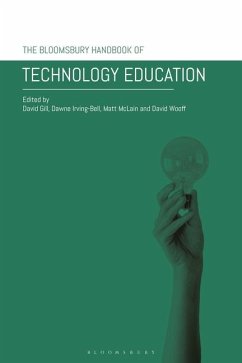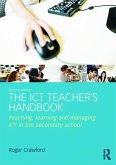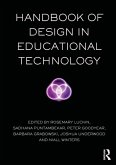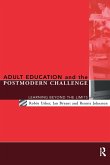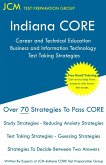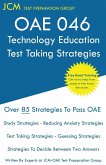The Bloomsbury Handbook of Technology Education
Herausgeber: Gill, David; Wooff, David; McLain, Matt; Irving-Bell, Dawne
The Bloomsbury Handbook of Technology Education
Herausgeber: Gill, David; Wooff, David; McLain, Matt; Irving-Bell, Dawne
- Broschiertes Buch
- Merkliste
- Auf die Merkliste
- Bewerten Bewerten
- Teilen
- Produkt teilen
- Produkterinnerung
- Produkterinnerung
The Bloomsbury Handbook of Technology Education draws together international perspectives on contemporary praxis in technology education from philosophy to empirical research. Through carefully commissioned chapters, leading authors explore the fundamentals of technology education, curriculum and pedagogy. Chapters discuss technology education as it can be experienced by children and young people, inside and outside of the classroom, across the world, as well as the importance of technology and the history and philosophical origins of technology education. Carefully curated, this is an…mehr
Andere Kunden interessierten sich auch für
![The ICT Teacher's Handbook The ICT Teacher's Handbook]() Roger CrawfordThe ICT Teacher's Handbook54,99 €
Roger CrawfordThe ICT Teacher's Handbook54,99 €![Handbook of Design in Educational Technology Handbook of Design in Educational Technology]() Handbook of Design in Educational Technology174,99 €
Handbook of Design in Educational Technology174,99 €![Adult Education and the Postmodern Challenge Adult Education and the Postmodern Challenge]() Ian BryantAdult Education and the Postmodern Challenge69,99 €
Ian BryantAdult Education and the Postmodern Challenge69,99 €![Education for Sustainable Development in the Caribbean Education for Sustainable Development in the Caribbean]() Lorna DownEducation for Sustainable Development in the Caribbean28,99 €
Lorna DownEducation for Sustainable Development in the Caribbean28,99 €![Indiana CORE Career and Technical Education Business and Information Technology Test Taking Strategies Indiana CORE Career and Technical Education Business and Information Technology Test Taking Strategies]() Jcm-Indiana Core Test Preparation GroupIndiana CORE Career and Technical Education Business and Information Technology Test Taking Strategies40,99 €
Jcm-Indiana Core Test Preparation GroupIndiana CORE Career and Technical Education Business and Information Technology Test Taking Strategies40,99 €![OAE 046 Technology Education - Test Taking Strategies OAE 046 Technology Education - Test Taking Strategies]() Jcm-Oae Test Preparation GroupOAE 046 Technology Education - Test Taking Strategies40,99 €
Jcm-Oae Test Preparation GroupOAE 046 Technology Education - Test Taking Strategies40,99 €![Problems and Trends in the Education of Blind Children and Youth Problems and Trends in the Education of Blind Children and Youth]() Problems and Trends in the Education of Blind Children and Youth16,99 €
Problems and Trends in the Education of Blind Children and Youth16,99 €-
-
-
The Bloomsbury Handbook of Technology Education draws together international perspectives on contemporary praxis in technology education from philosophy to empirical research. Through carefully commissioned chapters, leading authors explore the fundamentals of technology education, curriculum and pedagogy. Chapters discuss technology education as it can be experienced by children and young people, inside and outside of the classroom, across the world, as well as the importance of technology and the history and philosophical origins of technology education. Carefully curated, this is an innovative and exciting volume for students, teachers, teacher educators, researchers, lecturers and professors in technology education.
Hinweis: Dieser Artikel kann nur an eine deutsche Lieferadresse ausgeliefert werden.
Hinweis: Dieser Artikel kann nur an eine deutsche Lieferadresse ausgeliefert werden.
Produktdetails
- Produktdetails
- Verlag: Taylor & Francis Ltd (Sales)
- Seitenzahl: 464
- Erscheinungstermin: 29. Mai 2025
- Englisch
- Abmessung: 234mm x 156mm x 25mm
- Gewicht: 454g
- ISBN-13: 9781350242821
- ISBN-10: 1350242829
- Artikelnr.: 70957712
- Herstellerkennzeichnung
- Libri GmbH
- Europaallee 1
- 36244 Bad Hersfeld
- gpsr@libri.de
- Verlag: Taylor & Francis Ltd (Sales)
- Seitenzahl: 464
- Erscheinungstermin: 29. Mai 2025
- Englisch
- Abmessung: 234mm x 156mm x 25mm
- Gewicht: 454g
- ISBN-13: 9781350242821
- ISBN-10: 1350242829
- Artikelnr.: 70957712
- Herstellerkennzeichnung
- Libri GmbH
- Europaallee 1
- 36244 Bad Hersfeld
- gpsr@libri.de
David Gill is Assistant Professor of Technology Education at Memorial University of Newfoundland, Canada. Dawne Irving-Bell PhD, is Professor of Learning and Teaching at BPP University, a National Teaching Fellow and a Principal Fellow of the Higher Education Academy. She holds a Collaborative Award for Teaching Excellence and received a National Award in recognition of her outstanding contribution to teacher education. With a passion for visual thinking and technology education she established the 'The National Teaching Repository' an Open Education Resource with proven reach and impact across the global Higher Education community. Dawne is editor-in-chief of the Journal of Social-Media for Learning, and through her work within the International Society for the Scholarship of Teaching and Learning (ISSOTL) is committed to raising the profile of teaching and learning. Matt McLain is Senior Lecturer in Education and Professional Learning at Liverpool John Moores University, UK. David Wooff is an Associate Professor of Educational Practice, and Director of Apprenticeship Quality and Regulation for BPP University and the wider BPP Education Group. For nearly a decade, David successfully led the largest secondary undergraduate design and technology teacher education programme in England at Edge Hill University. He is a fellow of the Charted College of Teaching (FCCT); Society of Education and Training (FCET), Royal Society for Arts (FRSA), and a senior fellow of the Higher Education Academy (SFHEA). Widely published, his work has a global following and readership. His current interests lie in the Scholarship of Teaching and Learning (SoTL)and the position, and value, technology education has.
Foreword Acknowledgements 1. General Introduction
David Gill (Memorial University of Newfoundland
Canada)
Dawne Irving-Bell (Edge Hill University
UK)
Matt McLain (Liverpool John Moores University
UK) and David Wooff (BPP University
UK) Part I: Conceptualizing Technology Education 2. Introduction to Conceptualizing Technology Education
David Gill (Memorial University of Newfoundland
Canada) 3. Historical and Philosophical Origins of Technology Education
Jeffery Buckley (Technological University of the Shannon
Ireland) 4. Design and Technology Education in England
Stephanie Atkinson (University of Sunderland
UK) 5. Overview of Chinese High School General Technology Education: Rationale and Current Status
Xu Meidan
Gu Jianiun (Nanjing Normal University
China)
and P. John Williams (Curtin University
Australia) 6. Decentralized Technology Education Curricula Development
Jim Tuff and David Gill (Memorial University of Newfoundland
Canada) 7. Technology Education's Place in STEM: The Relationship and Role of Technology in STEM Education
Using the United States as a Case Study
Greg J. Strimel (Purdue University
USA) Part II: Technology Education in the Curriculum 8. Introduction to Technology Education in the Curriculum
David Wooff (BPP University
UK) 9. Thinking: Nurturing Independent Design Thinking and Decision Making
Belinda von Mengerson (Australian Catholic University
Australia) 10. Doing: Skills
Knowledge and Understanding in Conceptual
Theoretical and Practical Contexts
David Morrison-Love (University of Glasgow
UK) 11. Communicating: The Importance of Communication in a Technological Literacy Era
Yakhoub Ndiaye (École Normale Supérieure de Lyon
France) 12. Including: Thinking Towards an Inclusive Curriculum for Technology Education in German Primary Schools
Franz Schröer (University of Paderborn
Germany) and Claudia Tenberge(University of Münster
Germany) 13. Assessing: How To Get Feedback Back On Track In Technology Education
Eva Hartell (KTH Royal Institute of Technology
Sweden) 14. Collaborating: The Purpose and Potential of Collaboration With Stakeholders and Other Disciplines
David Wooff (BPP University
UK)
Ryan Beales (Wellfield Academy
UK) and Elizabeth Flynn (The Sutton Academy
UK) 15. Facilitating: The Role of Learning Environments in Technology Education Curricula
Matt McLain (Liverpool John Moores University
UK) and Sarah Finnigan-Moran (D&T Educator and Consultant) Part III: Pedagogy for Technology Education 16. Introduction to Pedagogy for Technology Education
Matt McLain (Liverpool John Moores University
UK) 17. Project-Based Learning: Authentic and Effective Learning in Technology Education
Osnat Dagan (Beit Berl College
Israel) 18. Task-Based Learning: An Opportunity for Focused Learning in Technology Education
Andrew Doyle (University of Waikato
New Zealand) 19. Design Learning: Pedagogic Strategies That Enable Learners to Develop Their Design Capability
Remke Klapwijk (Delft University of Technology
Netherlands) and Kay Stables (Goldsmiths University of London
UK) 20. Play-Based Learning: Play Pedagogies for Technology Education
Pauline Roberts and Marianne Knaus (Edith Cowan University
Australia) 21. Digital Learning: The Role of Digital Technologies in Technology Education
Deborah Winn (Neale-Wade Academy
UK) 22. Interdisciplinary Learning: Shifting Pedagogies of the Profession and the Muddy Puddle of STEM Teacher Associational Fluency
Michael A. de Miranda (Texas A&M University
USA) 23. Safety
Risk and Learning: How to Master a Risk and Safety in Technology Education Learning and Working Environments
Eila Lindfors (University of Turku
Finland) Part IV: Technology
Education and Society 24. Introduction to Technology
Education and Society
Dawne Irving-Bell (Edge Hill University
UK) 25. Philosophical and Political Perspectives: The Philosophical and Political Value of Technology Education Fostering Technological Multiliteracies
Jonas Hallström (Linköping University
Sweden) 26. Industrial Perspectives: Translational and Transactional Agendas
Rónán Dunbar
Niall Seery and Joseph Phelan (Technological University of the Shannon
Ireland) 27. Cultural Perspectives: The Sociocultural Role of Technology Education
Mishack T Gumbo (University of South Africa
South Africa) 28. Curricular and Noncurricular Perspectives: Developing a Technological Identity within Curricular and Non-Curricular Programs
Thomas Kennedy (Memorial University of Newfoundland
Canada) 29. Extracurricular Perspectives: Valuing Technology Beyond the Classroom
Mike Martin (Liverpool John Moores University
UK) 30. Social and Technological Perspectives: Technology's Influence on Society
Dawne Irving-Bell (Edge Hill University
UK) Afterword Index
David Gill (Memorial University of Newfoundland
Canada)
Dawne Irving-Bell (Edge Hill University
UK)
Matt McLain (Liverpool John Moores University
UK) and David Wooff (BPP University
UK) Part I: Conceptualizing Technology Education 2. Introduction to Conceptualizing Technology Education
David Gill (Memorial University of Newfoundland
Canada) 3. Historical and Philosophical Origins of Technology Education
Jeffery Buckley (Technological University of the Shannon
Ireland) 4. Design and Technology Education in England
Stephanie Atkinson (University of Sunderland
UK) 5. Overview of Chinese High School General Technology Education: Rationale and Current Status
Xu Meidan
Gu Jianiun (Nanjing Normal University
China)
and P. John Williams (Curtin University
Australia) 6. Decentralized Technology Education Curricula Development
Jim Tuff and David Gill (Memorial University of Newfoundland
Canada) 7. Technology Education's Place in STEM: The Relationship and Role of Technology in STEM Education
Using the United States as a Case Study
Greg J. Strimel (Purdue University
USA) Part II: Technology Education in the Curriculum 8. Introduction to Technology Education in the Curriculum
David Wooff (BPP University
UK) 9. Thinking: Nurturing Independent Design Thinking and Decision Making
Belinda von Mengerson (Australian Catholic University
Australia) 10. Doing: Skills
Knowledge and Understanding in Conceptual
Theoretical and Practical Contexts
David Morrison-Love (University of Glasgow
UK) 11. Communicating: The Importance of Communication in a Technological Literacy Era
Yakhoub Ndiaye (École Normale Supérieure de Lyon
France) 12. Including: Thinking Towards an Inclusive Curriculum for Technology Education in German Primary Schools
Franz Schröer (University of Paderborn
Germany) and Claudia Tenberge(University of Münster
Germany) 13. Assessing: How To Get Feedback Back On Track In Technology Education
Eva Hartell (KTH Royal Institute of Technology
Sweden) 14. Collaborating: The Purpose and Potential of Collaboration With Stakeholders and Other Disciplines
David Wooff (BPP University
UK)
Ryan Beales (Wellfield Academy
UK) and Elizabeth Flynn (The Sutton Academy
UK) 15. Facilitating: The Role of Learning Environments in Technology Education Curricula
Matt McLain (Liverpool John Moores University
UK) and Sarah Finnigan-Moran (D&T Educator and Consultant) Part III: Pedagogy for Technology Education 16. Introduction to Pedagogy for Technology Education
Matt McLain (Liverpool John Moores University
UK) 17. Project-Based Learning: Authentic and Effective Learning in Technology Education
Osnat Dagan (Beit Berl College
Israel) 18. Task-Based Learning: An Opportunity for Focused Learning in Technology Education
Andrew Doyle (University of Waikato
New Zealand) 19. Design Learning: Pedagogic Strategies That Enable Learners to Develop Their Design Capability
Remke Klapwijk (Delft University of Technology
Netherlands) and Kay Stables (Goldsmiths University of London
UK) 20. Play-Based Learning: Play Pedagogies for Technology Education
Pauline Roberts and Marianne Knaus (Edith Cowan University
Australia) 21. Digital Learning: The Role of Digital Technologies in Technology Education
Deborah Winn (Neale-Wade Academy
UK) 22. Interdisciplinary Learning: Shifting Pedagogies of the Profession and the Muddy Puddle of STEM Teacher Associational Fluency
Michael A. de Miranda (Texas A&M University
USA) 23. Safety
Risk and Learning: How to Master a Risk and Safety in Technology Education Learning and Working Environments
Eila Lindfors (University of Turku
Finland) Part IV: Technology
Education and Society 24. Introduction to Technology
Education and Society
Dawne Irving-Bell (Edge Hill University
UK) 25. Philosophical and Political Perspectives: The Philosophical and Political Value of Technology Education Fostering Technological Multiliteracies
Jonas Hallström (Linköping University
Sweden) 26. Industrial Perspectives: Translational and Transactional Agendas
Rónán Dunbar
Niall Seery and Joseph Phelan (Technological University of the Shannon
Ireland) 27. Cultural Perspectives: The Sociocultural Role of Technology Education
Mishack T Gumbo (University of South Africa
South Africa) 28. Curricular and Noncurricular Perspectives: Developing a Technological Identity within Curricular and Non-Curricular Programs
Thomas Kennedy (Memorial University of Newfoundland
Canada) 29. Extracurricular Perspectives: Valuing Technology Beyond the Classroom
Mike Martin (Liverpool John Moores University
UK) 30. Social and Technological Perspectives: Technology's Influence on Society
Dawne Irving-Bell (Edge Hill University
UK) Afterword Index
Foreword Acknowledgements 1. General Introduction
David Gill (Memorial University of Newfoundland
Canada)
Dawne Irving-Bell (Edge Hill University
UK)
Matt McLain (Liverpool John Moores University
UK) and David Wooff (BPP University
UK) Part I: Conceptualizing Technology Education 2. Introduction to Conceptualizing Technology Education
David Gill (Memorial University of Newfoundland
Canada) 3. Historical and Philosophical Origins of Technology Education
Jeffery Buckley (Technological University of the Shannon
Ireland) 4. Design and Technology Education in England
Stephanie Atkinson (University of Sunderland
UK) 5. Overview of Chinese High School General Technology Education: Rationale and Current Status
Xu Meidan
Gu Jianiun (Nanjing Normal University
China)
and P. John Williams (Curtin University
Australia) 6. Decentralized Technology Education Curricula Development
Jim Tuff and David Gill (Memorial University of Newfoundland
Canada) 7. Technology Education's Place in STEM: The Relationship and Role of Technology in STEM Education
Using the United States as a Case Study
Greg J. Strimel (Purdue University
USA) Part II: Technology Education in the Curriculum 8. Introduction to Technology Education in the Curriculum
David Wooff (BPP University
UK) 9. Thinking: Nurturing Independent Design Thinking and Decision Making
Belinda von Mengerson (Australian Catholic University
Australia) 10. Doing: Skills
Knowledge and Understanding in Conceptual
Theoretical and Practical Contexts
David Morrison-Love (University of Glasgow
UK) 11. Communicating: The Importance of Communication in a Technological Literacy Era
Yakhoub Ndiaye (École Normale Supérieure de Lyon
France) 12. Including: Thinking Towards an Inclusive Curriculum for Technology Education in German Primary Schools
Franz Schröer (University of Paderborn
Germany) and Claudia Tenberge(University of Münster
Germany) 13. Assessing: How To Get Feedback Back On Track In Technology Education
Eva Hartell (KTH Royal Institute of Technology
Sweden) 14. Collaborating: The Purpose and Potential of Collaboration With Stakeholders and Other Disciplines
David Wooff (BPP University
UK)
Ryan Beales (Wellfield Academy
UK) and Elizabeth Flynn (The Sutton Academy
UK) 15. Facilitating: The Role of Learning Environments in Technology Education Curricula
Matt McLain (Liverpool John Moores University
UK) and Sarah Finnigan-Moran (D&T Educator and Consultant) Part III: Pedagogy for Technology Education 16. Introduction to Pedagogy for Technology Education
Matt McLain (Liverpool John Moores University
UK) 17. Project-Based Learning: Authentic and Effective Learning in Technology Education
Osnat Dagan (Beit Berl College
Israel) 18. Task-Based Learning: An Opportunity for Focused Learning in Technology Education
Andrew Doyle (University of Waikato
New Zealand) 19. Design Learning: Pedagogic Strategies That Enable Learners to Develop Their Design Capability
Remke Klapwijk (Delft University of Technology
Netherlands) and Kay Stables (Goldsmiths University of London
UK) 20. Play-Based Learning: Play Pedagogies for Technology Education
Pauline Roberts and Marianne Knaus (Edith Cowan University
Australia) 21. Digital Learning: The Role of Digital Technologies in Technology Education
Deborah Winn (Neale-Wade Academy
UK) 22. Interdisciplinary Learning: Shifting Pedagogies of the Profession and the Muddy Puddle of STEM Teacher Associational Fluency
Michael A. de Miranda (Texas A&M University
USA) 23. Safety
Risk and Learning: How to Master a Risk and Safety in Technology Education Learning and Working Environments
Eila Lindfors (University of Turku
Finland) Part IV: Technology
Education and Society 24. Introduction to Technology
Education and Society
Dawne Irving-Bell (Edge Hill University
UK) 25. Philosophical and Political Perspectives: The Philosophical and Political Value of Technology Education Fostering Technological Multiliteracies
Jonas Hallström (Linköping University
Sweden) 26. Industrial Perspectives: Translational and Transactional Agendas
Rónán Dunbar
Niall Seery and Joseph Phelan (Technological University of the Shannon
Ireland) 27. Cultural Perspectives: The Sociocultural Role of Technology Education
Mishack T Gumbo (University of South Africa
South Africa) 28. Curricular and Noncurricular Perspectives: Developing a Technological Identity within Curricular and Non-Curricular Programs
Thomas Kennedy (Memorial University of Newfoundland
Canada) 29. Extracurricular Perspectives: Valuing Technology Beyond the Classroom
Mike Martin (Liverpool John Moores University
UK) 30. Social and Technological Perspectives: Technology's Influence on Society
Dawne Irving-Bell (Edge Hill University
UK) Afterword Index
David Gill (Memorial University of Newfoundland
Canada)
Dawne Irving-Bell (Edge Hill University
UK)
Matt McLain (Liverpool John Moores University
UK) and David Wooff (BPP University
UK) Part I: Conceptualizing Technology Education 2. Introduction to Conceptualizing Technology Education
David Gill (Memorial University of Newfoundland
Canada) 3. Historical and Philosophical Origins of Technology Education
Jeffery Buckley (Technological University of the Shannon
Ireland) 4. Design and Technology Education in England
Stephanie Atkinson (University of Sunderland
UK) 5. Overview of Chinese High School General Technology Education: Rationale and Current Status
Xu Meidan
Gu Jianiun (Nanjing Normal University
China)
and P. John Williams (Curtin University
Australia) 6. Decentralized Technology Education Curricula Development
Jim Tuff and David Gill (Memorial University of Newfoundland
Canada) 7. Technology Education's Place in STEM: The Relationship and Role of Technology in STEM Education
Using the United States as a Case Study
Greg J. Strimel (Purdue University
USA) Part II: Technology Education in the Curriculum 8. Introduction to Technology Education in the Curriculum
David Wooff (BPP University
UK) 9. Thinking: Nurturing Independent Design Thinking and Decision Making
Belinda von Mengerson (Australian Catholic University
Australia) 10. Doing: Skills
Knowledge and Understanding in Conceptual
Theoretical and Practical Contexts
David Morrison-Love (University of Glasgow
UK) 11. Communicating: The Importance of Communication in a Technological Literacy Era
Yakhoub Ndiaye (École Normale Supérieure de Lyon
France) 12. Including: Thinking Towards an Inclusive Curriculum for Technology Education in German Primary Schools
Franz Schröer (University of Paderborn
Germany) and Claudia Tenberge(University of Münster
Germany) 13. Assessing: How To Get Feedback Back On Track In Technology Education
Eva Hartell (KTH Royal Institute of Technology
Sweden) 14. Collaborating: The Purpose and Potential of Collaboration With Stakeholders and Other Disciplines
David Wooff (BPP University
UK)
Ryan Beales (Wellfield Academy
UK) and Elizabeth Flynn (The Sutton Academy
UK) 15. Facilitating: The Role of Learning Environments in Technology Education Curricula
Matt McLain (Liverpool John Moores University
UK) and Sarah Finnigan-Moran (D&T Educator and Consultant) Part III: Pedagogy for Technology Education 16. Introduction to Pedagogy for Technology Education
Matt McLain (Liverpool John Moores University
UK) 17. Project-Based Learning: Authentic and Effective Learning in Technology Education
Osnat Dagan (Beit Berl College
Israel) 18. Task-Based Learning: An Opportunity for Focused Learning in Technology Education
Andrew Doyle (University of Waikato
New Zealand) 19. Design Learning: Pedagogic Strategies That Enable Learners to Develop Their Design Capability
Remke Klapwijk (Delft University of Technology
Netherlands) and Kay Stables (Goldsmiths University of London
UK) 20. Play-Based Learning: Play Pedagogies for Technology Education
Pauline Roberts and Marianne Knaus (Edith Cowan University
Australia) 21. Digital Learning: The Role of Digital Technologies in Technology Education
Deborah Winn (Neale-Wade Academy
UK) 22. Interdisciplinary Learning: Shifting Pedagogies of the Profession and the Muddy Puddle of STEM Teacher Associational Fluency
Michael A. de Miranda (Texas A&M University
USA) 23. Safety
Risk and Learning: How to Master a Risk and Safety in Technology Education Learning and Working Environments
Eila Lindfors (University of Turku
Finland) Part IV: Technology
Education and Society 24. Introduction to Technology
Education and Society
Dawne Irving-Bell (Edge Hill University
UK) 25. Philosophical and Political Perspectives: The Philosophical and Political Value of Technology Education Fostering Technological Multiliteracies
Jonas Hallström (Linköping University
Sweden) 26. Industrial Perspectives: Translational and Transactional Agendas
Rónán Dunbar
Niall Seery and Joseph Phelan (Technological University of the Shannon
Ireland) 27. Cultural Perspectives: The Sociocultural Role of Technology Education
Mishack T Gumbo (University of South Africa
South Africa) 28. Curricular and Noncurricular Perspectives: Developing a Technological Identity within Curricular and Non-Curricular Programs
Thomas Kennedy (Memorial University of Newfoundland
Canada) 29. Extracurricular Perspectives: Valuing Technology Beyond the Classroom
Mike Martin (Liverpool John Moores University
UK) 30. Social and Technological Perspectives: Technology's Influence on Society
Dawne Irving-Bell (Edge Hill University
UK) Afterword Index

